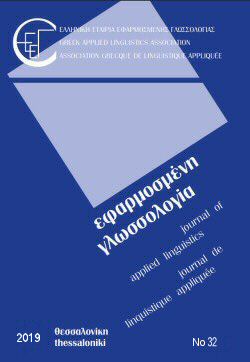Γιώργος Αγοραστός, Φερενίκη Καπετάνιου, Μαρία Παπαγεωργίου
Πιλοτικά μαθήματα γλωσσομάθειας του Κέντρου Διδασκαλίας Ξένων Γλωσσών: Η αξιολόγηση των φοιτητών
This paper presents the results of the course assessment conducted by students of the pilot courses in English, French and German for General and Specific Purposes taught by the authors on behalf of the Foreign Language Teaching Centre of the Aristotle University of Thessaloniki during 2015-16.The article focuses on evaluation questions regarding the degree of usefulness of the knowledge gained relative to the participants’ studies, the effectiveness of the teaching materials used, the degree of the attendants’ course participation and their desire for a permanent offer of these language programs. Finally, the conjecture that the courses for Academic Purposes stand out as more useful, necessary and effective (compared with those for General Purposes) among the participants is examined and related to their more targeted focus on basic academic skills, strategies for acquiring them and the usefulness of this knowledge in academic and non- academic ( e.g. professional) environments.
Thomai Alexiou, Marina Mattheoudakis, Dionysia Saratsli, Alexandros Vagenas
Words don’t come easy: Linguistic analysis of vocabulary in Magic Books
The present study focuses on the English as a Foreign Language (EFL) coursebooks Magic Book 1 and Magic Book 2 that have been designed and developed for third graders in the Greek state primary schools under the PEAP project. It aims to examine the lexical items selected for those coursebooks and set out the criteria that render them a useful tool for teaching EFL to young learners. More specifically, this paper aims to: (a) examine the frequency of the vocabulary included in the two books by using the frequency data of the British National Corpus (BNC), (b) compare the vocabulary of the books with the English Vocabulary Profile (EVP) issued by Cambridge University Press, and (c) examine the thematic areas covered in these books in order to investigate the extent of their continuity with the interests and needs of the target age group.
Georgia Fotiadou, Marina Mattheoudakis
A quasi-monolingual tertiary education in Greece: Baby steps to internationalisation
Although the state Greek education system has always been largely monolingual, this has been gradually changing mainly due to the large numbers of incoming populations from European and other countries. Changes in the monolingual profile of the country are also due to the decisions taken at a European level regarding the learning of at least two foreign languages starting at primary school. Given these changes and needs, the current paper focuses on the language profile of tertiary education in Greece and, in particular, of the Aristotle University of Thessaloniki (AUTh), the largest university in Greece. The data collected will be used to extrapolate about the language profile of tertiary education in Greece. The paper will also present the results of a small-scale survey among the foreign language students of the School of Modern Greek at AUTh in order to examine the language context to which they are exposed but also their beliefs regarding the monolingual and multilingual approach to education. The results of our study clearly indicate a change in the monolingual profile of Greece’s tertiary education and stress the need for top-down changes that will take into consideration the realistic needs of Greek students and academics but also issues such as the internationalisation of higher education.
Nikos Gogonas, Christina Maligkoudi
Translanguaging instances in the Greek linguistic landscape in times of crisis
In this article we discuss the concept of translanguaging in relation to the theory of linguistic landscape in the Greek context in times of economic and political crisis. In particular, we look at instances in Greek public spaces where there is a combination of linguistic resources. The instances used in this paper have a political and ideological meaning that is strongly related with the current economic and political situation in Greece, while these instances also show a creative dimension of different linguistic forms and resources. Public translanguaging instances in today’s multilingual Greece is a research area that has not been examined yet in the relevant literature. Thus, the aim of the present paper is to show the dynamics that translanguaging has taken over the past years in the multilingual context of the Greek society.
Yixin Wang-Taylor, James Milton
Predicting international students’ academic success with vocabulary and intercultural communicative competence
In the past few decades, the number of international Chinese students in Higher Education has increased rapidly. Recent studies have found that despite international Chinese students attaining the required language level for entry to courses, they are still facing many difficulties in conducting their academic activities. The aim of the current study is to identify a factor that can better predict international Chinese students’ academic performance in addition to vocabulary knowledge. This study is an attempt to use an interdisciplinary approach to combine a linguistic factor, vocabulary knowledge, with the non-linguistic factor, intercultural communicative competence in explaining performance. The results reveal that intercultural communicative competence can explain over 30% of students’ academic performance at the end of the academic year. It is concluded that when students’ English language proficiency is high, it is the understanding of the culture and the communication with the local people, which is more important in these international Chinese students’ abroad study.

